Forget about shoulder fired anti-aircraft missiles, roadside bombs or small arms fire.
The biggest threat facing Canadian helicopter crews departing for the UN peacekeeping mission in Mali this month will be the Saharan dust and sand, a high-ranking government official speaking at a briefing for journalists in Ottawa said Thursday.
Senior government officials speaking on background gave an overview of the peacekeeping mission.
Most of the violence in Mali is inter-ethnic and it is not necessarily directed at the UN, they said. Yet the country’s instability has been exploited by extremist forces, who have targeted the UN and the Malian national forces, turning the UN mission there into one of the deadliest peacekeeping operations, officials said.
However, most of those attacks have used small arms and improvised explosive devices (IEDs), which while being a deadly threat for soldiers on the ground, would be of little use against Canadian helicopters in the air.
Fighting the heat and dust
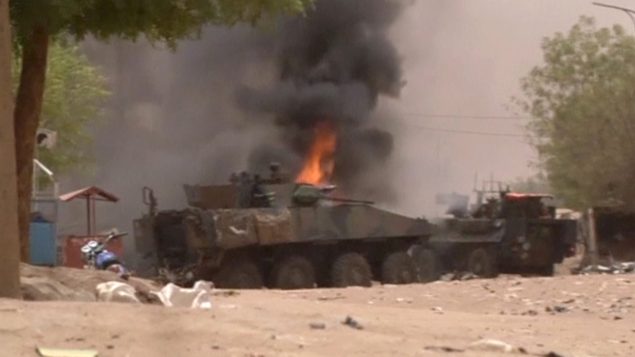
A still image taken from a video shows an armoured personnel carrier on fire after a car bomb attack in Gao, northern Mali July 1, 2018. (REUTERS/via Reuters TV)
But the country’s harsh desert climate is another matter.
“The environment or the climate in the Sahel will be our biggest threat,” an official said.
The sand creates a lot of abrasive for the helicopters’ moving parts and blades, causing huge headaches for flight engineers and technicians tasked with maintaining the aircraft that already operate at close to maximum capacity due to elevation and extreme heat.
However, Canadian soldiers are ready to operate and take care of themselves and their equipment in hot and dusty environment of the Malian desert, officials said.
Soldiers and police to be deployed
The mission of the Canadian military contingent would be to provide the United Nations Multidimensional Integrated Stabilization Mission in Mali (MINUSMA) with a 24/7 aeromedical evacuation capability to safeguard the lives of UN and other forces, as well as civilians, officials said.
Additionally on a case-by-case basis Canadian forces would be available to assist in transporting UN troops and materiel.
Canada will also deploy up to 20 civilian police officers to support the United Nations peacekeeping mission and the European Union civilian capacity-building mission, EUCAP Sahel, in Mali, officials said.
But details of the deployment of Canadian police officers have yet to be worked out, officials said.
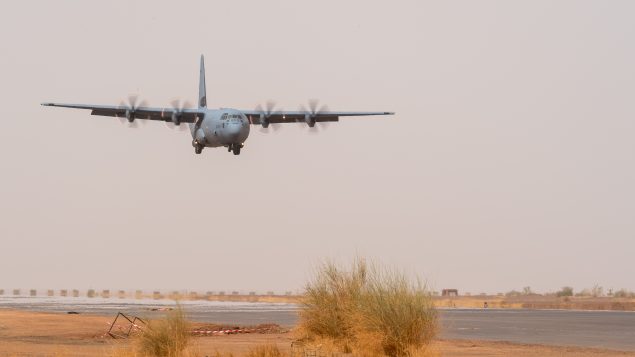
A CC-130 Hercules is the first large aircraft to land on the newly constructed runway at Gao, Mali in support of Operation PRESENCE – Mali on June 29, 2018. (Canadian Forces Combat Camera)
The Canadian soldiers will be based at a UN base in Gao, in northeastern Mali, about 1,000 km northeast of capital Bamako.
The Canadian task force will be comprised of 250 troops and include three medium lift CH-147F Chinook helicopters and five CH-146 Griffon helicopters. The lightly armed Griffons will be providing security to the Chinooks that are equipped to provide care for up to two critically injured patients as well as several walking wounded.
The Canadians will be flying in teams of three aircraft: two Griffon armed escorts and a Chinook medical transport to pick up the wounded, while the Griffons make sure the medical team on the Chinook is protected while they are collecting the injured.
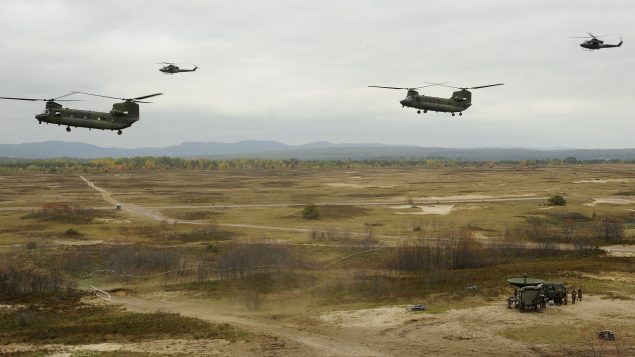
Two CH-147F Chinook helicopters from 450 Tactical Helicopter Squadron and two CH-146 Griffon helicopters from 427 Special Operations Aviation Squadron hover over a simulated enemy position during an air assault demonstration as part of Exercise Collaborative Spirit on October 1, 2014 at Garrison Petawawa, Ontario. (Sgt. Jean-Francois Lauzé, Garrison Imaging Petawawa)
One Chinook and one Griffon will act as spares in case one of the choppers breaks down.
The Canadian contingent will be comprised of air crew, maintenance technicians, medical professionals, support staff and others, officials said.
Another 10 Canadian officers will serve at the UN headquarters in the war-torn west African country.
Setting up the base
To set up the base and move the equipment and personnel the military is deploying a theatre opening team comprised of 280 logistics and combat services support personnel who will return to Canada once the Canadian base is up and running.
Their job will be to prepare the base, set up the equipment the Canadians will need as well as assemble the helicopters that will arrive in Mali partially disassembled on board large transport aircraft.
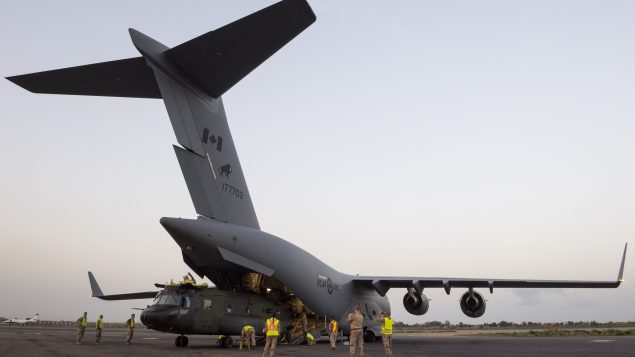
A CH-147F Chinook helicopter from 450 Tactical Helicopter Squadron is unloaded from CC-177 Globemaster during Operation PRESENCE on 4 July 2018, in West Africa.
(Canadian Forces Combat Camera)
The first Chinook helicopter is already en route to Mali via neighbouring Burkina Faso.
The theatre opening team parts of which have arrived in Mali in May is expected to return to Canada at the end of July.
The task force commander Col. Chris McKenna will depart for Mali in the coming days and is expected to assume tactical command of the mission by July 13, officials said.
The Canadian helicopters and crews are expected to be fully up and running by mid-August.
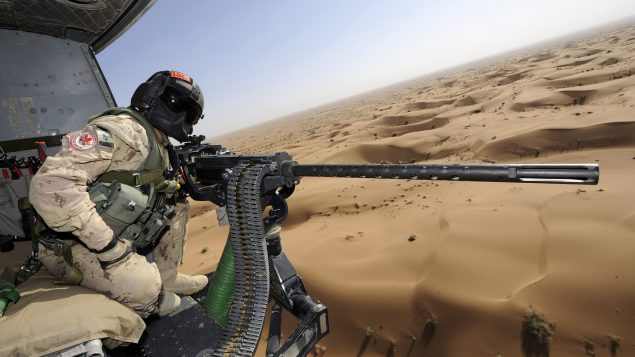






For reasons beyond our control, and for an undetermined period of time, our comment section is now closed. However, our social networks remain open to your contributions.